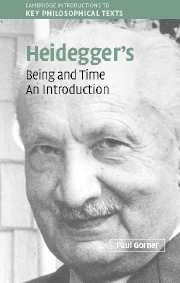9 - Beyond phenomenology
Published online by Cambridge University Press: 05 June 2012
Summary
The subject matter of Being and Time is being – the being of Dasein and the being of entities other than Dasein to which Dasein comports itself. The method Heidegger employs in what, for a time at least, he called the science of being is phenomenology. We have seen that there are profound differences between Heidegger's conception of phenomenology and that of Husserl. However, despite the differences, it is still possible to see Heidegger's phenomenology as a form of transcendental philosophy. Viewed in this way it would be a radicalisation, rather than a straightforward rejection, of Husserl's transcendental phenomenology. In Heidegger's view it is not enough simply to describe the intentional structures of consciousness in order to be able to see how intentionality, or as he would put it, comportment to entities, is possible. Intentionality must be seen not as a structure of consciousness but as a structure of Dasein, the essence of whose being is the understanding of being. It is the understanding of being which makes intentionality possible. It is Heidegger's concern with the understanding of being as what makes comportment to entities possible which makes it legitimate to see his phenomenology as a form of transcendental philosophy.
- Type
- Chapter
- Information
- Heidegger's Being and TimeAn Introduction, pp. 171 - 179Publisher: Cambridge University PressPrint publication year: 2007

